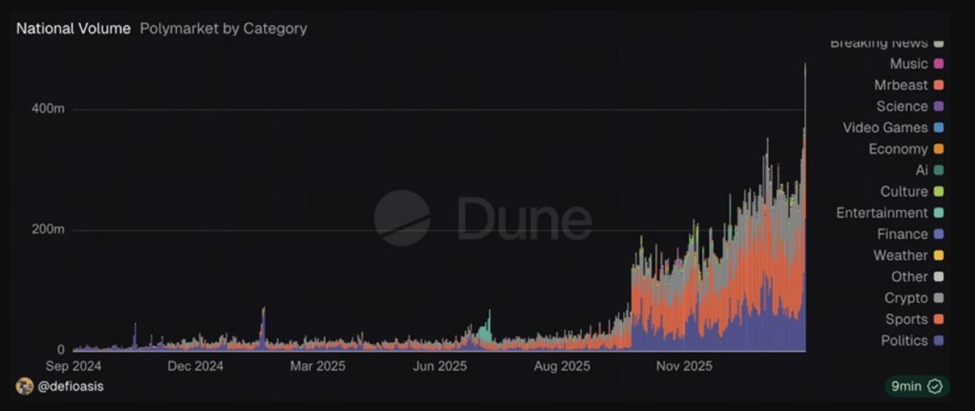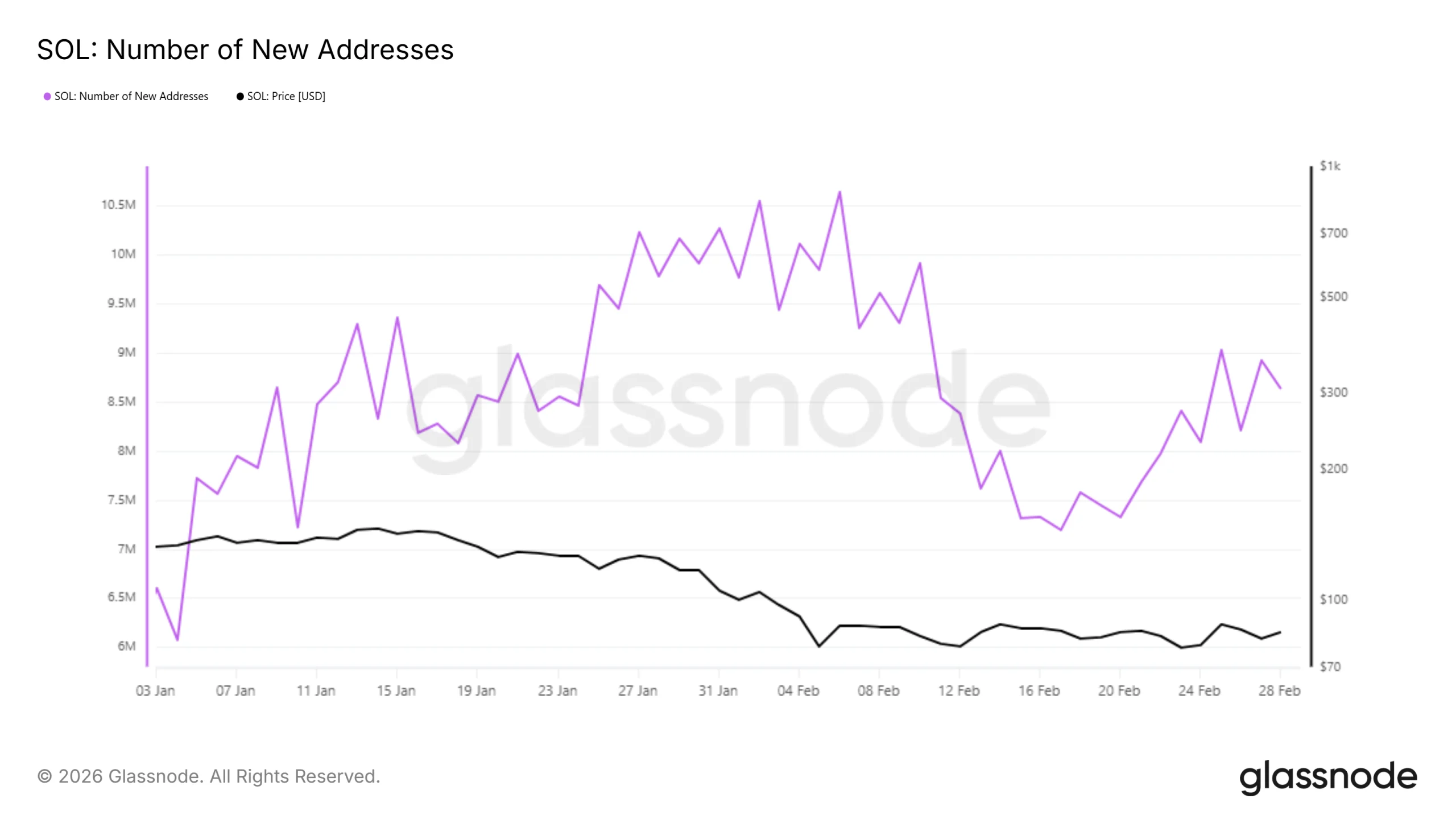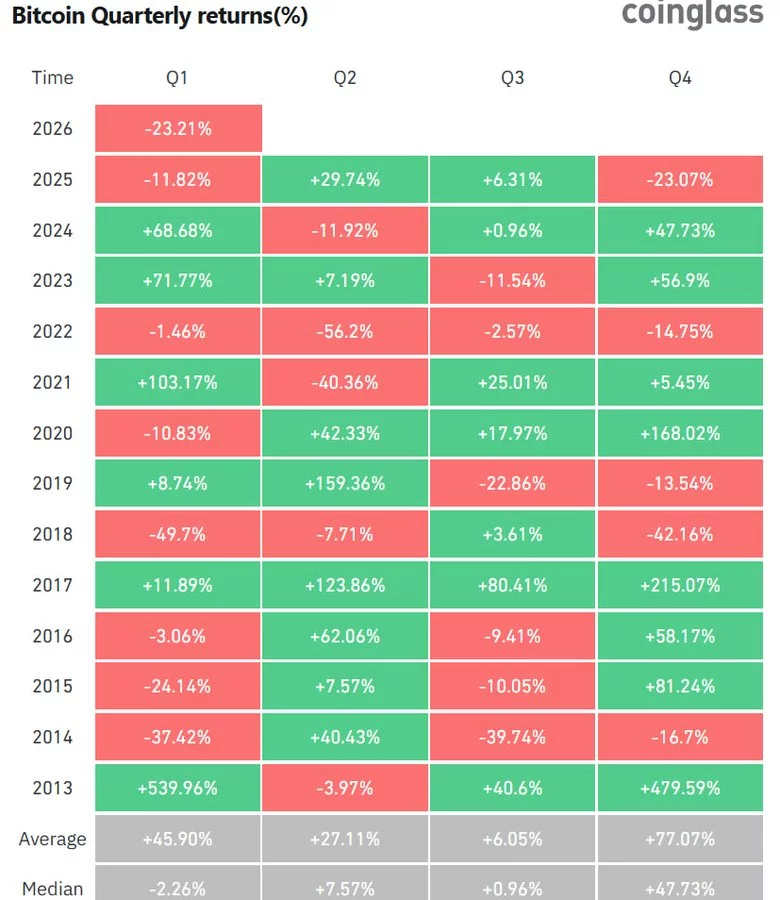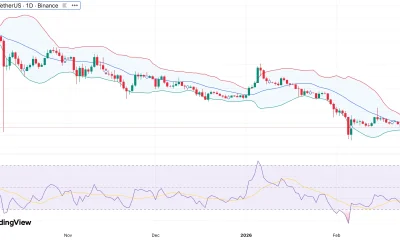Crypto World
Polymarket Breaks $478 Million Record

Polymarket recorded a single-day notional trading volume of $478 million, with the politics category alone accounting for $220 million, nearly half of total daily activity.
Elsewhere, rival prediction market Kalshi was on the receiving end of user backlash after a controversial contract over the Khamenei market.
Polymarket Sets Historic Record as Geopolitical Tensions Drive Crypto Betting
Prediction markets surged to historic highs as the United States and Israel launched coordinated strikes on Iran.
Polymarket reached an all-time high across the platform and its political markets. According to data aggregated by Defioasis, Polymarket’s spike coincided directly with the strikes.
It signals the platform’s capacity to price geopolitical events faster than TradFi markets or polling models.
Certain strike-timing contracts set their own records, with individual trades clearing up to $90 million, reflecting the massive liquidity flowing into the platform.
However, the traction was also marred by allegations of insider trading, with Bubblemaps identifying at least six addresses that profited approximately $1.2 million from bets tied to the Iran conflict.
The surge in activity shows how prediction markets are increasingly blurring the line between financial speculation and geopolitical forecasting, drawing attention from traders, lawmakers, and regulators.
The timely pricing of real-world events demonstrates the efficiency of blockchain-based markets. However, it also raises concerns about transparency and fairness, particularly when wallets appear to perfectly anticipate outcomes.
Kalshi Faces Backlash Over Khamenei Market, CEO Defends Settlement and Ethics
Meanwhile, Kalshi, a US-regulated prediction market, faced its own controversy with the contract titled “Ali Khamenei out as Supreme Leader?”
The market, which had accumulated over $50 million in total volume, saw roughly $20 million traded on strike day alone.
Following Khamenei’s reported death during the strikes, critics argued the platform had effectively created a proxy death market, despite its stated rules against profiting from death outcomes.
Kalshi CEO Tarek Mansour addressed the backlash on X (Twitter), emphasizing that all positions would be settled at pre-death last-traded prices. Meanwhile, post-death positions would be fully reimbursed, including all trading fees.
Mansour defended the market’s design as consistent with U.S. regulations. He noted that leadership changes in Iran carry significant geopolitical, economic, and national security implications. This, he said, makes such markets relevant without directly incentivizing death.
“A market on Ali Khamenei’s out as Supreme Leader was important because leadership changes in Iran have a major impact on the world order,” Mansour wrote, outlining that traders could still profit or lose based on legitimate political outcomes rather than mortality.
The settlement process, he explained, adhered strictly to the CFTC-filed contract terms, which referenced the last-traded price prior to Khamenei’s death, even amid ambiguities in reporting timelines.
On the one hand, Polymarket is setting new benchmarks for trading volume amid geopolitical tension. Meanwhile, Kalshi is facing ethical scrutiny.
Both events highlight the potential and the risks of prediction markets. These platforms offer unprecedented speed and transparency in pricing world events.
However, as February 28 demonstrated, they also amplify ethical dilemmas and regulatory attention during crypto-driven speculation.
Crypto World
Strategy Raises STRC Dividend to 11.50% Amid Bitcoin Losses and Mounting Pressure on MSTR

TLDR:
- Strategy raised its STRC preferred stock dividend by 25 basis points, bringing the annual rate to 11.50%.
- MSTR fell 14% in February, marking eight straight months of losses as Bitcoin dropped nearly 20% that month.
- Strategy now holds 717,722 BTC at an average cost of $76,020, carrying an unrealized loss of around $6.5 billion.
- Saylor posted “The Turn of the Century” on X, signaling a potential new Bitcoin purchase may be disclosed soon.
Strategy has lifted the dividend rate on its preferred stock, STRC, by 25 basis points to 11.50%. Executive Chairman Michael Saylor led the decision amid continued pressure on the company’s common stock, MSTR.
The move marks the seventh dividend increase since STRC began trading in July 2025. Bitcoin’s sharp decline in February added urgency to the adjustment.
Seventh Dividend Hike Targets Price Stability
Strategy raised the annualized payout on its perpetual preferred stock, STRC, to 11.50%. The 25 basis point increase keeps the shares trading close to their $100 par value. STRC closed at $100 on Friday after dipping below that level during February.
The company positions STRC as a short-duration, high-yield savings instrument. Monthly cash distributions are adjusted regularly to reduce price swings. This structure has largely worked, keeping STRC in a tight range since its launch.
The dividend rate is reviewed each month based on market conditions. When STRC trades below par, Strategy typically boosts the payout to attract buyers. This latest adjustment follows the same pattern seen in prior months.
MSTR Posts Eighth Straight Monthly Decline
Strategy’s common stock, MSTR, fell 14% in February, extending a losing streak to eight consecutive months. Bitcoin dropped nearly 20% during the same period, pulling MSTR lower alongside it. The correlation between the two remains strong, as Bitcoin makes up the bulk of Strategy’s balance sheet.
The company holds 717,722 BTC as of mid-February, after purchasing 592 BTC at an average price of $67,286. This purchase marked the firm’s 100th recorded Bitcoin acquisition. The average entry price across all holdings now stands at $76,020 per coin.
With Bitcoin currently trading well below that cost basis, Strategy is sitting on an unrealized loss of around $6.5 billion.
Saylor shared a tracker showing the treasury valued at approximately $48 billion. The gap between cost and current value has grown as the market retreat continues.
Saylor Signals More Bitcoin Buying Ahead
On March 1, Saylor posted “The Turn of the Century” on X, a phrase that has drawn attention from market watchers.
Based on past patterns, Strategy typically discloses a new Bitcoin purchase the day after such posts. Traders and analysts closely follow these signals ahead of official filings.
Despite the losses, Saylor suggested another weekly purchase could be coming. The firm has maintained a long-term approach to its Bitcoin treasury program, even under market stress. Strategy stated it could sustain operations even if Bitcoin dropped to $8,000.
The company has also shifted its funding strategy in recent months. Rather than issuing common stock to finance Bitcoin purchases, Strategy has leaned more heavily on preferred capital.
Executives noted this structure may take on an even larger role throughout the year as volatility continues.
Crypto World
Hyperliquid (HYPE) Price’s Golden Cross Hangs On This Condition

Hyperliquid price has attempted a steady recovery in recent sessions, regaining part of its prior losses. HYPE has not completely lost bullish momentum. However, futures market positioning suggests resistance remains strong, keeping the altcoin vulnerable to sudden volatility.
While spot traders show cautious optimism, derivatives data highlights persistent bearish pressure.
Hyperliquid Traders Must Watch This Level
The liquidation map shows that Hyperliquid contracts are currently skewed toward bearish exposure. A cluster of $28.9 million in short liquidations sits above the $35 price level. This concentration reflects significant short positioning among futures traders.
Dominant short exposure indicates that many traders expect downside continuation. However, heavy short interest also creates squeeze potential. If HYPE crosses $35 decisively, forced short liquidations could amplify upside volatility and quickly shift market sentiment.
Want more token insights like this? Sign up for Editor Harsh Notariya’s Daily Crypto Newsletter here.
Technical indicators offer a more constructive short-term outlook. The Moving Average Convergence Divergence indicator registered a bullish crossover on Sunday. This signal often marks strengthening upside momentum.
MACD’s upward shift suggests buying pressure may build gradually. Momentum oscillators reflect improving trend conditions despite futures skepticism. If spot demand aligns with technical signals, HYPE could regain upward traction in the near term.
HYPE Price May Face Resistance
Hyperliquid price is currently facing mixed signals, leaving direction dependent on broader crypto market conditions. Geopolitical tensions and macro uncertainty could limit investor risk appetite. If external sentiment weakens, HYPE may struggle to sustain upward momentum.
Should the market avoid a severe bearish reaction, HYPE could push above $34 resistance. A breakout toward $36 would place the price near the $35 liquidation cluster. Triggering approximately $28.9 million in short liquidations could accelerate gains toward $38. Such a move may also bring the 50-day and 200-day exponential moving averages closer together, setting up a potential Golden Cross formation, which would be achieved following the short liquidations.
Conversely, renewed bearish conditions would undermine this outlook. A breakdown below $30 support could shift sentiment decisively negative. Loss of this level would expose $26 as the next major support for HYPE price. Such a move would invalidate the bullish thesis and disrupt the month-and-a-half uptrend structure currently in place.
Crypto World
AI may accelerate Ethereum roadmap and security


Ethereum co-founder Vitalik Buterin said artificial intelligence could ramp up the network’s development roadmap while improving security standards.
Summary
- Vitalik says AI could speed up Ethereum’s roadmap and delivery timelines.
- Half of AI gains should go toward stronger testing and formal verification.
- AI may help make near bug-free crypto code a realistic expectation.
Responding to an experiment where someone “vibe-coded” Ethereum’s entire 2030 roadmap within weeks, Buterin wrote that “six months ago, even this was far outside the realm of possibility, and what matters is where the trend is going.”
Buterin personally tested AI coding by building an equivalent of his blog software within an hour using his laptop.
The Ethereum founder suggested taking half the speed gains from AI and applying them to security through more test cases, formal verification, and multiple implementations.
“People should be open to the possibility (not certainty! possibility) that the Ethereum roadmap will finish much faster than people expect, at a much higher standard of security than people expect.”
AI enables formal verification of complex cryptographic proofs
A collaborator of the Lean Ethereum project managed to AI-code a machine-verifiable proof of one of the most complex theorems that STARKs rely on for security.
The Lean Ethereum initiative aims to formally verify all components, with AI improving the ability to achieve that goal.
Buterin noted that simply generating a much larger body of test cases matters beyond formal verification.
The two-week roadmap experiment contained “massive caveats: almost certainly lots of critical bugs, and probably in some cases ‘stub’ versions of a thing where the AI did not even try making the full version.”
The right approach splits AI gains between speed and security improvements. “Do not assume that you’ll be able to put in a single prompt and get a highly-secure version out anytime soon; there WILL be lots of wrestling with bugs and inconsistencies between implementations,” Buterin warned.
Bug-free code could shift from idealistic delusion to basic expectation
Buterin expressed excitement about the possibility that bug-free code, “long considered an idealistic delusion, will finally become first possible and then a basic expectation.” He framed this as necessary for trustlessness in crypto systems.
Total security remains impossible as it would require exact correspondence between lines of code and contents of the mind, which Buterin estimated at many terabytes of information.
Specific security claims can be made and verified in particular cases, cutting out over 99% of negative consequences from broken code.
The statement shows AI as a tool for both ramping up development timelines and raising security bars simultaneously.
Buterin’s framework suggests AI could remove that tradeoff by enabling thorough security verification at development speeds previously impossible.
Crypto World
Buterin Targets Ethereum’s Core Bottlenecks with Bold Overhaul


Vitalik Buterin is shifting the Ethereum scaling conversation away from Layer 2 (L2) and back to the protocol’s core.
The Russo-Canadian innovator argues that Ethereum’s biggest long-term constraints are not rollups or blob capacity, but deeper architectural bottlenecks inside the network’s state tree and virtual machine.
Vitalik Buterin Proposes Deep Ethereum Overhaul Targeting State Tree and Virtual Machine Bottlenecks
According to Buterin, two components — the network’s state tree and virtual machine — account for more than 80% of the proving costs. This, he says, is a critical issue as zero-knowledge (ZK) technology becomes central to Ethereum’s roadmap.
“Today I’ll focus on two big things: state tree changes, and VM changes,” Buterin wrote, adding that both are “the big bottlenecks that we have to address if we want efficient proving.”
A Binary Tree Overhaul
At the heart of the proposal is EIP-7864, which would replace Ethereum’s current hexary Merkle Patricia tree with a binary tree design.
The change may sound subtle, but its implications are significant. Binary trees would produce Merkle proofs roughly 4 times shorter than the current structure, dramatically reducing verification bandwidth requirements.
That makes lightweight clients and privacy-preserving applications cheaper and more viable.
The new structure would also group storage slots into “pages,” allowing applications that load related data to do so more efficiently.
Many decentralized applications (dApps) repeatedly access adjacent storage slots. This means the upgrade could save more than 10,000 gas per transaction in some cases.
Buterin also suggested pairing the tree change with more efficient hash functions, potentially delivering further gains in proof generation speed.
More importantly, the redesign would make Ethereum’s base layer more “prover-friendly,” allowing ZK applications to integrate directly with Ethereum’s state instead of building parallel systems.
Zooming out, the binary tree proposal aims to consolidate a decade of lessons on state management into a cleaner, future-proof structure.
A Future Beyond the EVM?
Even more ambitious is Buterin’s long-term vision for Ethereum’s execution engine. He floated the idea of eventually moving beyond the Ethereum Virtual Machine (EVM) toward a RISC-V–based architecture.
RISC-V is a widely used open instruction set that could offer greater efficiency and simplicity.
Buterin argued that Ethereum’s increasing reliance on special-case precompiles reflects a deeper discomfort with the EVM itself.
If Ethereum’s core promise is general-purpose programmability, he suggested, then the VM should fully support that vision without excessive workarounds. A RISC-V-based VM could:
- Reduce complexity
- Improve raw execution efficiency, and
- Better align with modern zero-knowledge proving systems, many of which already use RISC-V environments internally.
In the near term, Buterin proposed a “vectorized math precompile,” described as a “GPU for the EVM.” This could significantly accelerate cryptographic operations.
Longer term, he outlined a phased transition in which RISC-V would first power precompiles, then support user-deployed contracts, and eventually absorb the EVM itself as a compatibility layer.
Debate Over Complexity
However, not everyone is convinced Ethereum needs more deep-layer changes. Analyst DBCrypto criticized what he described as growing abstraction across the Ethereum roadmap, including new frameworks aimed at addressing rollup fragmentation.
Each additional layer, he argued, increases complexity, introduces trust assumptions, and creates additional potential attack surfaces.
The tension reflects a broader debate over whether Ethereum should continue layering solutions on top of its existing design or rework its foundation.
However, according to Vitalik Buterin, Ethereum’s architecture must evolve and adapt as zero-knowledge proofs move from a niche to a necessity.
The next phase of scaling, he suggests, may not occur on Layer 2 but rather deep within Ethereum’s core.
Crypto World
Altcoin Season Index Is Rising While Bitcoin Remains Under Pressure: Here is Why

TLDR:
- The Altcoin Season Index shows 24 out of 55 altcoins outperforming Bitcoin on a rolling 60-day basis.
- Altcoin bear markets historically last 7 to 11 months, while Bitcoin bear markets typically run closer to 12 months.
- Many altcoins have already dropped 80% to 90% from cycle highs, leaving less room to set new lows.
- The index measures relative performance, meaning altcoins are falling less than Bitcoin, not necessarily recovering yet.
The Altcoin Season Index is rising, and the numbers behind it tell a specific story. At 24 out of 55 altcoins outperforming Bitcoin over a rolling 60-day period, the index sits just below the midpoint between Bitcoin season and altcoin season.
The direction from its recent low is upward. Understanding what the index actually measures helps explain why this reading matters in the current market environment.
What the Index Measures and Why the Current Reading Stands Out
The Altcoin Season Index tracks relative performance, not absolute price movement. When more altcoins outperform Bitcoin over a 60-day window, the index rises.
That does not mean altcoins are going up in price. It means they are falling less than Bitcoin during the same period.
This distinction is critical for reading the current data correctly. Crypto markets remain under broad pressure, with fear at historically high levels. Yet the index has been climbing from its recent trough.
That combination points to altcoins holding ground better than Bitcoin, not staging independent recoveries.
Analyst Joao Wedson addressed this pattern directly in a recent post. He noted that altcoin bear markets historically last between 7 and 11 months, while Bitcoin bear markets run closer to 12 months.
That shorter cycle duration means a portion of the altcoin market can complete its bear phase while Bitcoin is still declining. The index rising during Bitcoin weakness is consistent with that historical pattern.
The chart history of the index shows it can move from the neutral zone into altcoin season territory quickly. It can also reverse just as fast. The current reading reflects what is happening across the altcoin market right now, not what comes next.
The Floor Dynamic Behind the Data
A second factor helps explain the index behavior. Many altcoins have already declined 80% to 90% or more from their cycle highs.
Assets that have fallen that far carry less downside risk in percentage terms, even if Bitcoin drops further. That arithmetic shapes how the index moves.
Wedson noted that two thirds of altcoins may not set new lows even if Bitcoin makes fresh cycle lows. That observation is not a bullish call.
It reflects the reality that deeply discounted assets have proportionally less room to fall further. The index rising during this period is partly a result of that floor dynamic playing out across the altcoin market.
During the middle phase of Bitcoin bear markets, history shows that many altcoins rally and outperform BTC. That mid-cycle divergence is visible in the current data.
The index moving upward while Bitcoin remains under pressure aligns with how this phase has unfolded in previous cycles.
Wedson also noted that altcoins can serve as a vehicle to accumulate more Bitcoin in this environment. Rotating through discounted altcoins that outperform Bitcoin can grow BTC holdings over time.
He acknowledged the strategy carries complexity for most investors, but the data behind the index supports the broader market dynamic he describes.
Crypto World
Kalshi founder updates on Iran’s Khamenei market carveout

Prediction-market operator Kalshi voided certain contracts tied to the death of Iran’s top leader after his passing was confirmed, saying it designed safeguards to prevent profits from outcomes involving death. The death, reported by Iranian state media early Sunday after an attack by Israel and the United States, prompted traders to move into markets such as “Ali Khamenei out as Supreme Leader.” Co-founder Tarek Mansour explained on X that the platform does not list markets directly connected to death and that the rules were applied to prevent profit from such outcomes. Kalshi has since reimbursed fees for the affected market and set settlements according to the last-traded price prior to the death event.
In the platform’s own words, the policy is clear and longstanding: death-related markets are not listed, and mechanisms exist to deter profit from catastrophic events. Kalshi reiterated this stance on Saturday, stressing that the death carveout was embedded in the market’s rules. Still, the decision generated backlash online, with users arguing that the platform was curbing potential profits. The linked market for the event—“Ali Khamenei out as Supreme Leader”—remains available only under the clarified rules, and the refunds reflect Kalshi’s effort to close the episode with financial fairness for participants who were in before and after the event.
The exchange said it would reimburse all fees for participants in the death-market and would settle traders who held bets based on the last-traded price before the death. Those who opened positions after the death were also reimbursed, with the difference between the entry price and the last-traded price returned. The policy has become a focal point for debates about how prediction markets should respond to geopolitical turnarounds and sensitive events, highlighting tensions between user expectations and platform safety nets.
The broader conversation around political and geopolitical markets extended beyond Kalshi. Earlier coverage highlighted a related issue on rival platforms, where questions about insider trading and the surfacing of sensitive information prompted scrutiny. For instance, a February episode on Polymarket drew attention after six traders netted about $1 million on bets about a U.S. strike on Iran, with wallets created that month and some positions filled just hours before explosions in Tehran, according to Bloomberg. Among other threads, the narrative tied into comments from political figures who criticized information handling and raised questions about the integrity of event-driven markets.
Kalshi’s position underscores a recurring tension in prediction markets: the desire for liquidity and profitability versus safeguards that prevent exploitation of real-world events. The company’s co-founder, in his post on X, framed the approach as a principled stance to prevent profit from death, a line that some traders interpret as protective discipline and others as a restraint on market opportunities. The platform’s ongoing emphasis on rule-based conduct suggests a continued commitment to transparency around how markets are structured and settled, including how post-event price dynamics influence refunds and settlements.
In parallel coverage, a briefing about related insider-trading concerns on Polymarket signaled how geopolitical volatility can intensify debate around predictive trading. The February surge in bets around a potential strike on Iran, coupled with the rapid wallet activity observed by analysts, prompted calls for enhanced scrutiny of how information flows influence on-chain markets. While Kalshi’s policy remains explicit about death-related markets, the broader ecosystem continues to wrestle with questions about fairness, transparency, and the potential for speculative activity to intersect with real-world events in unpredictable ways. The discussions around those questions—spurred by both Kalshi’s decision and the Polymarket episode—reflect the evolving regulatory and community norms governing digital-age prediction platforms.
Key takeaways
- Kalshi voided the “Ali Khamenei out as Supreme Leader” market after confirmation of the death, applying rules designed to prevent profits tied to death-related outcomes.
- The platform reimbursed all fees for the affected market and settled positions using the last-traded price prior to the death event.
- Traders who opened positions after the death were refunded the difference between entry prices and the last-traded price, according to Kalshi’s announcements.
- The death-market policy is described as long-standing, with the rules clearly stated in the market’s framework, yet the decision drew online backlash from users who felt profits were being curtailed.
- Geopolitical event-driven markets on other platforms, such as Polymarket, have faced insider-trading scrutiny and rapid, market-driven activity around sensitive events, illustrating broader tensions in the space.
Sentiment: Neutral
Price impact: Neutral. The refunds and settlement mechanics aimed to neutralize profit opportunities tied to the event, with no evidence of material market disruption described in the sources.
Market context: The episode sits within a broader pattern of how prediction markets respond to geopolitical shocks, balancing user demand for tradable exposure with safeguards to deter exploitation of real-world events. As regulators and platforms scrutinize on-chain and event-based markets, governance decisions like Kalshi’s illustrate how policy design shapes liquidity, risk, and user trust across the ecosystem.
Why it matters
The decision to void a death-related market and refund participants highlights a core challenge for modern prediction platforms: protecting users while maintaining transparent, rule-based operations around volatile, high-stakes events. For traders, this episode reinforces that markets anchored to real-world outcomes can trigger rapid policy shifts, especially when outcomes touch sensitive or destabilizing events. The policy keeps the platform aligned with ethical considerations that discourage profiting from human tragedy, but it also raises questions about the breadth of such rules and how they apply to future situations.
From the builders’ perspective, Kalshi’s stance demonstrates how market design can embed safeguards that reduce mispricing risk and potential manipulation. The explicit rule set—paired with a clear post-event settlement framework—provides a reproducible approach for handling similar events in the future. For users, the episode underscores the importance of understanding the platform’s rules before placing bets, particularly in markets connected to political or humanitarian events that may spiral into unforeseen consequences.
For the broader crypto and on-chain ecosystem, the episode sits at the intersection of liquidity, risk sentiment, and regulatory scrutiny. It accents the ongoing debate about how decentralized or semi-decentralized prediction markets should operate when real-world events intersect with volatile capital flows. As the market landscape evolves, stakeholders will watch for how platforms balance openness and safety, how settlements are executed in edge cases, and how governance processes respond to investor expectations during periods of geopolitical flux.
What to watch next
- Kalshi’s continued enforcement and clarification of its death-market policy, including any updates to the market’s rules or post-event settlement practices.
- Regulatory or community responses to the incident, and whether other markets adjust their own death-related or sensitive-event rules in response.
- Ongoing scrutiny of insider-trading allegations on prediction markets, particularly around geopolitical events, and what disclosures or safeguards platforms adopt.
- Developments around the specific market page for this event (kxkhameneiout) and any subsequent disclosures from Kalshi about settlements or future similar markets.
- Further analysis or reports on how price discovery and liquidity behave in event-driven markets during geopolitical shocks, including comparisons with rival platforms.
Sources & verification
Kalshi’s death-market decision and its implications
Kalshi faced a moment of policy clarity as it acted to void a market tied to the death of a major political figure and to reorganize post-event settlements. The company’s leadership underscored that markets framing fatal outcomes were never intended to function as profit channels, reinforcing a boundary around event-driven contracts that hinge on real-world violence or loss. The decision to reimburse all fees for the affected market and to settle participants using the last-traded price prior to the event reflects a deliberate approach to minimize financial risk for users while upholding a principled rule set. In parallel, the company reaffirmed the rule that markets do not list death-related outcomes, a position that has implications for how the platform will handle similar events in the future and how users should approach these markets going forward.
From a governance perspective, the episode demonstrates the importance of transparent disclosures and timely communication with users. By publicizing the policy and the settlement approach, Kalshi aims to maintain trust and deter opportunistic trading around sensitive developments. For participants, the refunds and price-based settlements provide a defined path for recourse when the market design encounters unforeseen real-world triggers. For observers and analysts, the event serves as a case study in how prediction markets navigate the delicate balance between liquidity and ethical boundaries, and how this balance shapes the broader market’s resilience amid geopolitical tension.
Looking ahead, industry watchers will be watching for how Kalshi and other platforms articulate any updates to their market rules, how they monitor for potential rule violations in edge-case scenarios, and how regulators respond to the increasing convergence of finance with geopolitics in the digital trading space. The dialogue surrounding dead-man markets, insider trading concerns, and the integrity of price discovery in crisis moments is likely to intensify as platforms refine their policies and governance practices in the months ahead.
Crypto World
Solana Price Coils for Big Move After 4 Weeks of Consolidation

Solana price has remained rangebound for nearly four weeks, trading within a tight horizontal structure. The altcoin has repeatedly tested both support and resistance without establishing a decisive trend.
This prolonged consolidation has compressed volatility and placed investor behavior at the center of the next potential breakout.
Market conditions now present a two-sided scenario. A surge in demand could trigger a sharp upward move. Conversely, weakening conviction may push SOL toward lower support levels.
Solana Holders Need To Hold On
On-chain data shows that new Solana addresses are rising again. Increased network onboarding signals renewed interest in the ecosystem. Fresh participants typically introduce additional liquidity, which can support price stability and breakout attempts.
Over the past 12 days, daily new addresses have increased by 1.4 million, reaching 8.6 million. This expansion indicates improving engagement across the network. Growing user activity strengthens the fundamental case for Solana and could underpin a future price advance if sustained.
Want more token insights like this? Sign up for Editor Harsh Notariya’s Daily Crypto Newsletter here.
The HODLer net position change metric reveals continued resilience among long-term holders. While the pace of accumulation has slowed, the broader trend still reflects net positive positioning. Long-term conviction remains intact despite short-term volatility.
However, the moderation in buying momentum is notable. Persistent holding has helped keep the Solana price consolidated rather than declining sharply. If long-term holders shift from accumulation to distribution, downside pressure could intensify quickly and disrupt the current balance.
SOL Price Breakout On The Cards
Solana is trading at $85 at the time of writing, confined within a $77 to $88 range. Multiple breakout attempts have failed, reinforcing the strength of these boundaries. A decisive move beyond either level is likely to define short-term direction.
Bollinger Bands are converging, signaling a volatility squeeze. Such compression often precedes a significant price expansion. If bullish momentum aligns with the volatility release, SOL could breach $88 and target $97. A sustained move above $97 would place Solana back above $100, restoring broader optimism.

However, failure to attract sufficient buying pressure may result in continued range-bound movement. If long-term holders reduce exposure, the Solana price could revisit $77 support. A breakdown below that threshold would expose $67 as the next key level, invalidating the bullish thesis and reinforcing a bearish outlook.
Crypto World
Bitcoin logs third-worst Q1, Ethereum falls 32%

Bitcoin posted a -23.21% return in Q1 2026 and marked the third-worst first-quarter performance since 2013 according to CoinGlass data.
Summary
- Bitcoin fell 23% in Q1 2026, its third-worst first quarter on record.
- Ethereum dropped 32%, also marking its third-worst Q1 performance.
- Back-to-back quarterly losses follow the October 2025 market peak.
The loss falls far below Bitcoin’s (BTC) historical Q1 average of 45.90% and sits well below the median return of -2.26%.
Only two prior first quarters posted worse performance: Q1 2018 at -49.7% and Q1 2014 at -37.42%.
Ethereum fared worse with -32.17% in Q1 2026, also the third-worst since 2016, trailing its historical Q1 average of 66.45% and median return of 4.37%.
Bitcoin historical Q1 pattern shows mixed performance across years
Bitcoin’s quarterly returns since 2013 show no consistent first-quarter pattern. Strong Q1 gains in 2013 (+539.96%), 2021 (+103.17%), 2023 (+71.77%), and 2024 (+68.68%) contrast sharply with losses in 2014 (-37.42%), 2015 (-24.14%), 2018 (-49.7%), 2022 (-1.46%), 2025 (-11.82%), and 2026 (-23.21%).
The historical Q1 average of 45.90% gets pulled higher by extreme outliers like 2013’s +539.96% and 2021’s +103.17%.

The median Q1 return of -2.26% provides a more accurate picture, showing first quarters tend toward slight losses more often than gains.
Q4 historically posts the strongest performance with a 77.07% average and 47.73% median. Q2 averages 27.11% with a 7.57% median, while Q3 averages 6.05% with a 0.96% median.
Recent years show increasing volatility. 2024 posted strong gains across Q1 (+68.68%), Q3 (+0.96%), and Q4 (+47.73%) while Q2 dropped -11.92%. 2025 saw Q2 (+29.74%) and Q3 (+6.31%) gains offset by Q1 (-11.82%) and Q4 (-23.07%) losses.
2026 Q1 decline follows October liquidation event
The Q1 2026 loss follows Bitcoin’s October 2025 all-time high and the October 10 liquidation event that triggered $19 billion in market-wide liquidations.
Bitcoin fell from $126,080 to current levels around $66,000, a 48% decline from the peak.
Q1 2026’s -23.21% return exceeds Q4 2025’s -23.07% loss, creating back-to-back losing quarters.
The last time Bitcoin posted consecutive quarterly declines occurred in 2022, which saw losses across all four quarters: -1.46%, -56.2%, -2.57%, and -14.75%.
Crypto World
Stablecoins Challenge Traditional Banks as Yield Gap Widens and Regulatory Debate Intensifies

TLDR:
- Stablecoins like USDC and PYUSD now offer yields above 4%, far outpacing bank savings rates near 0.01%.
- The CLARITY Act missed its March 1, 2026 deadline amid heavy banking industry resistance in the Senate.
- Tokenized T-bills settle instantly and globally, cutting out SWIFT fees and traditional multi-day windows.
- JPMorgan analysts flagged CLARITY Act passage as a potential trigger for major crypto inflows in late 2026.
Stablecoins are reshaping how retail and institutional investors think about deposit alternatives. Digital dollar assets like USDC and PYUSD now offer yields above 4%, delivered through exchanges, wallets, and decentralized protocols.
Meanwhile, traditional savings accounts at major banks remain near 0.01%. The growing gap has sparked fierce debate in Washington, with the CLARITY Act stalling past its March 1, 2026 White House deadline amid continued banking industry resistance.
Yield Competition Puts Banks Under Pressure
Banks have long profited by collecting deposits at low rates and lending them out at 5–7%. That spread model is now facing a direct challenge from stablecoin issuers.
Treasury-bill reserves backing these digital assets generate 4–5% returns, which platforms pass along to holders through revenue-sharing programs.
Crypto analyst Adam Livingston argued on X that the banking sector is losing this battle by choice. He wrote that stablecoins offer “zero branches, zero tellers, and zero KYC theater for every transaction” while reserves sit in actual T-bills that return yield directly to users.
The cost structure difference between banks and stablecoin issuers is hard to ignore. Legacy systems, compliance teams, and physical infrastructure drive overhead costs for traditional banks. Stablecoin platforms, by contrast, operate with far leaner models and pass savings to users.
Regulatory Battles Reflect Industry Tensions
The GENIUS Act attempted to prevent stablecoin issuers from paying direct interest to holders. However, the market adapted quickly.
Exchanges and smart contracts now route Treasury returns to users without issuers paying interest directly.
The CLARITY Act, which would have established broader crypto market structure rules, missed its March 1 deadline. Banking lobbyists remain active in Senate Banking Committee discussions.
Critics say the industry is pushing for regulatory barriers rather than competing on product quality.
Livingston was pointed in his criticism, writing that banks “pressured the OCC into a 376-page rulemaking precisely to close loopholes” that allowed customers to earn market-rate yields. He suggested the banking lobby prefers legislative protection over innovation.
The Office of the Comptroller of the Currency rulemaking referenced in that critique targeted programs like Coinbase’s revenue-sharing model. Whether regulators will sustain that approach remains an open question as the debate continues in Congress.
Market Shifts Signal Long-Term Structural Change
Tokenized real-world assets are already settling on-chain at faster speeds and lower costs than traditional systems.
Products like tokenized T-bills allow investors to hold interest-bearing instruments globally without SWIFT fees or multi-day settlement windows. This represents a fundamental change in how capital moves.
JPMorgan’s internal analysts, according to Livingston, have quietly acknowledged that CLARITY Act passage could trigger significant crypto inflows in the second half of 2026.
Meanwhile, both retail and institutional money continues moving toward yield-bearing digital assets. The trend is gaining momentum regardless of legislative outcomes.
The Silicon Valley Bank collapse in 2023 added a new dimension to the stablecoin conversation. Fully reserved stablecoins carry a different risk profile than fractional-reserve bank deposits, and that distinction is drawing attention from investors who lived through recent bank failures.
The deposit flight narrative is no longer theoretical — it is showing up in capital flow data across the financial sector.
Crypto World
Handling $50M in ARC Perpetual Volume


Lighter reported that its upgraded liquidity pool system successfully limited ADL losses to a pre-determined threshold.
On February 26, Lighter, a decentralized crypto exchange, announced that its upgraded liquidity pool system successfully resisted a $50 million ARC perpetual long squeeze attempt.
This occurred after approximately 600 traders reversed a whale’s position, resulting in an $8.2 million loss, and the episode tested Lighter’s newly launched LLP Strategies, capping the downside risk for liquidity providers at just $75,000.
LLP Strategies Face First Stress Event
In a February 17 post on X, Lighter announced changes to its LLP infrastructure, splitting liquidity into separate strategies for different market types, including RWAs. Risk, liquidations, and auto-deleveraging are now handled at the strategy level rather than across the entire pool.
That structure faced what the platform called its “first battle test” on February 26. According to Lighter, a trader had built a large long position in ARC perpetuals over several days, with around 600 other traders and market makers taking the short side and pushing total open interest to $50 million.
ARC perp trading was assigned to Strategy #7, a high-risk strategy with about $75,000 in allocated USDC. Lighter said this meant only that portion of LLP deposits could be exposed if auto-deleveraging occurred.
As ARC’s price fell around 6 p.m. ET on February 26, the large long position was first liquidated on the order book for roughly $2 million. Lighter said LLP was initially in profit on the position, but further downside depleted Strategy #7, triggering another ADL at 0.071123. In the end, the whale lost about $8.2 million, LLP lost its capped $75,000 allocation, and short traders who held their positions were profitable.
ARC Price Collapse
The unwind left visible scars on the ARC price chart, with data from CoinGecko showing the token experienced a flash crash in the early hours of February 27, sliding from around $0.031 to $0.025 before recovering to $0.0348.
You may also like:
At the time of writing, ARC, which powers the Ryzome agentic AI “app store,” was down over 9% in 24 hours and nearly 59% across seven days. The token has also lost more than 63% of its value in the past two weeks, as well as falling 42% over 30 days. It currently sits 95% below its January 2025 all-time high of $0.62, having shed nearly 88% off its price in the past year.
This turbulence matches up with observations from crypto commentator Simon Dedic, who noted that ARC’s value had dipped overnight by about 80% on volumes approaching $400 million, which was nearly ten times its fully diluted valuation.
Dedic pointed out that before dumping, the token had been “massively outperforming” despite a weak market, even suggesting it had been “heavily manipulated.”
The concerns raised by Dedic echo a broader industry debate about market integrity. Just last month, Base co-founder Jesse Pollak rejected the idea of behind-the-scenes manipulation, stating his team won’t coordinate or deploy capital to influence prices because markets “deserve to be free, open, and fair.”
Binance Free $600 (CryptoPotato Exclusive): Use this link to register a new account and receive $600 exclusive welcome offer on Binance (full details).
LIMITED OFFER for CryptoPotato readers at Bybit: Use this link to register and open a $500 FREE position on any coin!
-

 Sports6 days ago
Sports6 days agoWomen’s college basketball rankings: Iowa reenters top 10, Auriemma makes history
-

 Fashion2 days ago
Fashion2 days agoWeekend Open Thread: Iris Top
-

 Politics6 days ago
Politics6 days agoNick Reiner Enters Plea In Deaths Of Parents Rob And Michele
-

 Business5 days ago
Business5 days agoTrue Citrus debuts functional drink mix collection
-

 Politics3 days ago
Politics3 days agoITV enters Gaza with IDF amid ongoing genocide
-

 Tech19 hours ago
Tech19 hours agoUnihertz’s Titan 2 Elite Arrives Just as Physical Keyboards Refuse to Fade Away
-
Sports2 days ago
The Vikings Need a Duck
-

 Crypto World6 days ago
Crypto World6 days agoXRP price enters “dead zone” as Binance leverage hits lows
-

 Tech5 days ago
Tech5 days agoUnsurprisingly, Apple's board gets what it wants in 2026 shareholder meeting
-

 NewsBeat1 day ago
NewsBeat1 day agoDubai flights cancelled as Brit told airspace closed ’10 minutes after boarding’
-

 NewsBeat1 day ago
NewsBeat1 day agoThe empty pub on busy Cambridge road that has been boarded up for years
-

 NewsBeat4 days ago
NewsBeat4 days agoCuba says its forces have killed four on US-registered speedboat | World News
-

 NewsBeat9 hours ago
NewsBeat9 hours ago‘Significant’ damage to boarded-up Horden house after fire
-

 NewsBeat4 days ago
NewsBeat4 days agoManchester Central Mosque issues statement as it imposes new measures ‘with immediate effect’ after armed men enter
-

 NewsBeat7 days ago
NewsBeat7 days ago‘Hourly’ method from gastroenterologist ‘helps reduce air travel bloating’
-

 NewsBeat1 day ago
NewsBeat1 day agoAbusive parents will now be treated like sex offenders and placed on a ‘child cruelty register’ | News UK
-

 NewsBeat5 days ago
NewsBeat5 days agoPolice latest as search for missing woman enters day nine
-

 Business4 days ago
Business4 days agoDiscord Pushes Implementation of Global Age Checks to Second Half of 2026
-
Sports6 days ago
2026 NFL mock draft: WRs fly off the board in first round entering combine week
-

 Business3 days ago
Business3 days agoOnly 4% of women globally reside in countries that offer almost complete legal equality

















